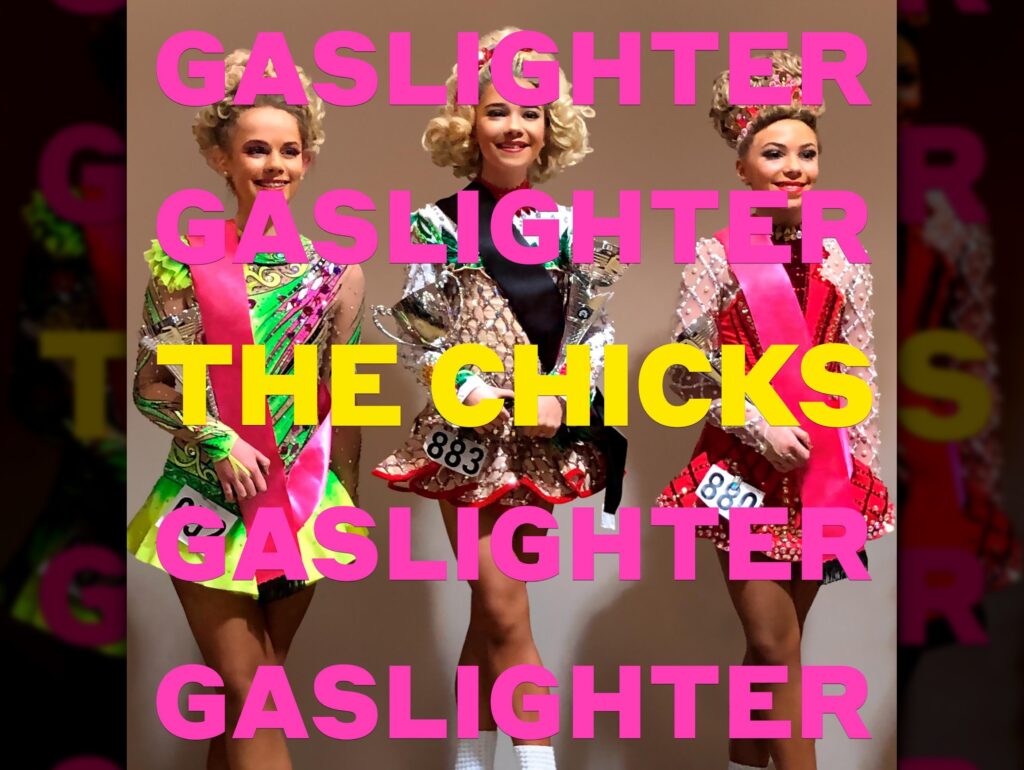‘Just Had to Start a Fire’: The Chicks’ Queer Escape from Country
“Gaslighter,” The Chicks
By James Barker, Contributing Writer

The Dixie Chicks were key to my embracing of country music when I was growing up and coming out. They were what most of the genre could never reach, but everything that only country music could seem to do. The expression of growing up in the countryside and feeling both attached and constrained by it all; wanting to feel that you belonged there, but not prepared to compromise on who you were to be accepted. That was what The Dixie Chicks represented to me.
The last time the band – recently, of course, renamed The Chicks – released an album was in 2006, just three years after ‘the incident’ where they criticized the Iraq war, and the misogynist backlash that followed. For some, this all but confirmed country music’s nationalism, racism and bigotry, not to mention homophobia and transphobia. But for those of us who were invested in this music, we were left feeling homeless in a genre that seemingly didn’t want to know us.
Since then the industry has been using “being Dixie-Chicked” as a cautionary tale to prevent women speaking out for well over a decade now. Women have struggled for airplay on country radio, and LGBTQ+ people and people of color have barely had a shot at all. A reckoning with country music as a genre, as an industry, and as a community is long overdue.
At the same time, The Chicks have gained a number of fans from across different genres (especially rock and pop), which has enabled the band’s legacy to endure, as much as some on Music Row and in country radio may prefer that it was forgotten.
Now, in 2020, The Chicks’ have released their first album in 14 years, Gaslighter. If I was hoping to get that reckoning, I was not going to get it here. What we get is a band unapologetically asserting their agency, an album that is gloriously ‘The Chicks’, and is unashamedly ambivalent about country music, the country establishment and country radio. Sorry not sorry country, but you’re going to have to use your own labor to sort out your dirty laundry.
The only song that provides any possibility of a reckoning is ‘March March’. Abigail Covington’s great article in these pages argues that the video and song demonstrate the group’s ‘support of the many marginalized communities that are so often ignored by the popular country music complex’. The song, with its unequivocal support for Black Lives Matter and LGBTQ+ rights, makes it clear what The Chicks stand for, as opposed to the country music establishment.
Gaslighter does not try to make a statement about what country music is, and is seemingly unbothered about whether Nashville and its gatekeepers are paying attention. Gaslighter’s political moments quickly give way to a more confessional style, with tabloid-worthy autobiographical detail about lead singer Natalie Maines’ divorce from her husband. But running deeper is The Chicks’ timeless combination of humor, defiance, vulnerability and storytelling.
That is not to say that Gaslighter is not country at all. The musical fundamentals of the band remain: Maines’ bluesy twang in her voice, Strayer’s banjo, Maguire’s fiddle, the band’s harmonies, alongside the songs’ lyrical qualities. However, as reviewers such as Chris Willman in Variety have pointed out, these elements are arranged in ways that distinguish them from country enough to establish The Chicks’ own sound, but not too much that it make a statement of it.
The current single, ‘Sleep at Night,’ reflects on Maines’ husband’s infidelity, while also demonstrating the strength of The Chicks as a unit. The production highlights the band’s harmonies; Martie Maguire’s fiddle playing and Emily Strayer’s banjo playing almost become voices supporting one another. Whether this is country, whether this is pop, this is unmistakably The Chicks.
Strength, solidarity and resilience run through this album in a way that resonates with us as LGBTQ+ listeners. In ‘Julianna Calm Down’ Maines calls us to ‘strut the fuck around like you’ve got nothing to lose’. In ‘For Her’ there’s a weary, yet clear, resolve ‘to get a whole let stronger’ and ‘stand up, show up’ for one another as a community. In ‘Young Man,’ a song addressed to Maines’ son about his father, we’re invited to ‘take the best parts’ of what our parents have taught us, and forge a better way ahead.
And that way ahead may not be country. I have to admit I went into Gaslighter hoping for The Chicks to set the world of country music straight, and reclaim the genre on behalf of anyone who ever felt that they didn’t belong there. Instead, Gaslighter offers a glimpse of a musical world where we can belong, just not one that’s defined by or narrowed to cowboys, country roads or picket fences.